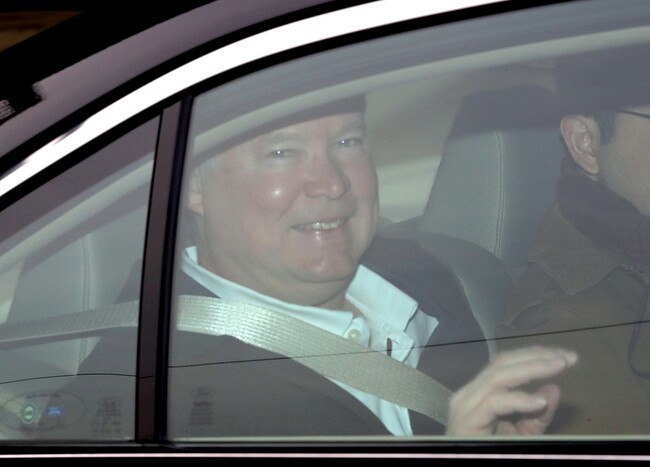hankyoreh
Links to other country sites 다른 나라 사이트 링크
Biegun reportedly being advised by two separate teams ahead of 2nd N. Korea-US summit

US State Department Special Representative for North Korea Stephen Biegun may be hearing advice from the so-called “Stanford team” and “Carnegie team” as he spearheads working-level negotiations with North Korea, a Washington Post columnist speculated. The two expert groups amount to “tutors” for Biegun, who is attempting a step-by-step, simultaneous solution on the North Korean nuclear issue.
On Feb. 12, Washington Post foreign affairs columnist David Ignatius published a piece titled “Trump’s summit with Kim Jong Un is partly hot air. It could also make the world safer.” In it, he wrote that Biegun “has been collecting ideas from experts from Stanford and the Carnegie Endowment for International Peace.” Adding that it was unclear what was discussed in their conversations with Biegun, Ignatius went on to describe the two expert groups’ approach on North Korea issues.
The Carnegie team, which is led by Ariel Levite and Toby Dalton, has focused on the question of how to verify the limits of North Korea’s nuclear and missile programs amid its lack of modern infrastructure and poor record-keeping, Ignatius wrote. He went on to characterize the Carnegie team as advocating a form of “probabilistic verification,” or developing a reliable overall assessment of Pyongyang’s compliances without necessarily verifying every one of its nuclear weapons.
The Stanford team is led by nuclear physicist Siegfried Hecker – who has personally observed the nuclear facilities at Yongbyon – along with visiting scholar Robert Carlin and researcher Elliot Serbin. Experts on this team argue that North Korea “will not give up its [nuclear] weapons and its weapons program until its security can be assured,” Ignatius said.
“Such assurance cannot be achieved simply by an American promise or an agreement on paper, it will require a substantial period of co-existence and interdependence [to build trust] [. . .] that may stretch to 10 years,” he quoted the experts as saying.
Biegun met with the experts on Jan. 31 at Stanford, where he delivered a talk in which he referred to pursuing denuclearization “simultaneously and in parallel.” The practical views of the expert groups may be seen as having had an influence on his approach to North Korea issues.
By Hwang Joon-bum, Washington correspondent
Please direct comments or questions to [english@hani.co.kr]

Editorial・opinion
![[Guest essay] The real reason Korea’s new right wants to dub Rhee a founding father [Guest essay] The real reason Korea’s new right wants to dub Rhee a founding father](https://flexible.img.hani.co.kr/flexible/normal/500/300/imgdb/original/2024/0423/8317138574257878.jpg) [Guest essay] The real reason Korea’s new right wants to dub Rhee a founding father
[Guest essay] The real reason Korea’s new right wants to dub Rhee a founding father![[Column] ‘Choson’: Is it time we start referring to N. Korea in its own terms? [Column] ‘Choson’: Is it time we start referring to N. Korea in its own terms?](https://flexible.img.hani.co.kr/flexible/normal/500/300/imgdb/original/2024/0423/3617138579390322.jpg) [Column] ‘Choson’: Is it time we start referring to N. Korea in its own terms?
[Column] ‘Choson’: Is it time we start referring to N. Korea in its own terms?- [Editorial] Japan’s rewriting of history with Korea has gone too far
- [Column] The president’s questionable capacity for dialogue
- [Column] Are chaebol firms just pizza pies for families to divvy up as they please?
- [Column] Has Korea, too, crossed the Rubicon on China?
- [Correspondent’s column] In Japan’s alliance with US, echoes of its past alliances with UK
- [Editorial] Does Yoon think the Korean public is wrong?
- [Editorial] As it bolsters its alliance with US, Japan must be accountable for past
- [Guest essay] Amending the Constitution is Yoon’s key to leaving office in public’s good graces
Most viewed articles
- 1[Column] ‘Choson’: Is it time we start referring to N. Korea in its own terms?
- 2Opposition calls Yoon’s chief of staff appointment a ‘slap in the face’
- 3[Guest essay] The real reason Korea’s new right wants to dub Rhee a founding father
- 4Senior doctors cut hours, prepare to resign as government refuses to scrap medical reform plan
- 5Why Korea shouldn’t welcome Japan’s newly beefed up defense cooperation with US
- 6New AI-based translation tools make their way into everyday life in Korea
- 7[Editorial] Japan’s rewriting of history with Korea has gone too far
- 8Terry Anderson, AP reporter who informed world of massacre in Gwangju, dies at 76
- 9[Column] Has Korea, too, crossed the Rubicon on China?
- 10[Column] The clock is ticking for Korea’s first lady